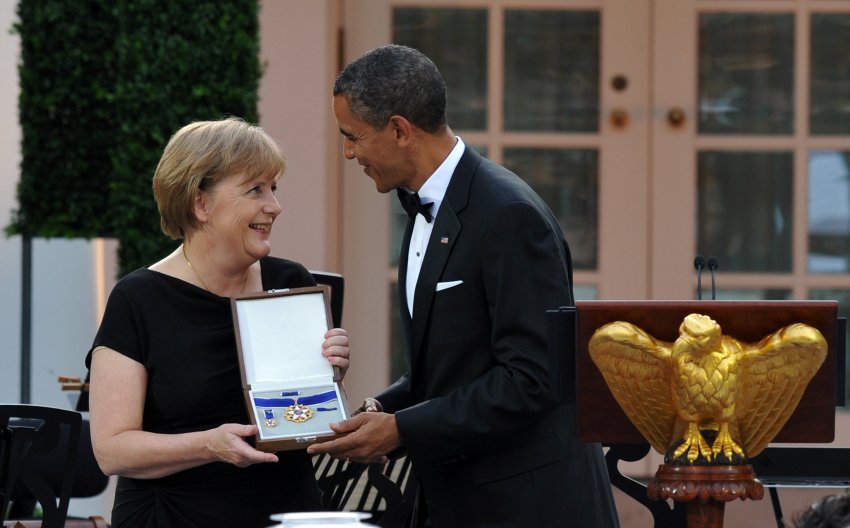
Fresh from a week in Europe working to give a boost to the transatlantic partnership, President Obama brought the leader of Europe’s most important country to the White House to present America’s highest award.
In an East Room joint press conference yesterday morning, Obama declared "Germany is one of our strongest allies" and observed, "We see our partnership in the courage of our service members who stand shoulder to shoulder in Afghanistan — where Germans serve under Americans and Americans serve under Germans." Perhaps seeking to dispel the notion that he hasn’t paid enough attention to Europe, he noted "this is our tenth meeting together. That doesn’t include the many phone calls and video conferences that we seem to have at all hours of the day and night. There’s hardly any global issue where we don’t consult one another." He added, " I’m confident that the great alliance between our nations is going to remain an indispensable pillar of a world that’s more secure and more prosperous and more just."
Speaking of his guest, Chancellor Angela Merkel, he remarked, "I trust her. And as she’s said herself, it’s just fun to work together. And it has been, again, fun today, even as we’ve addressed some very urgent challenges."
When her turn came, Merkel noted that US-German relations goes beyond trade and security. "If we remind ourselves of the fact that every fifth American today rightly points and perhaps also with a certain degree of pride to his German ancestry or her German ancestry, we can safely say that we, indeed, share common roots."
On a more personal note, she added, "Without the United States of America, I would in all probably not be able to stand here before you today. Overcoming the Cold War required courage from the people of Central and Eastern Europe and what was then the German Democratic Republic, but it also required the steadfastness of Western partner over many decades when many had long lost hope of integration of the two Germanys and Europe. Many perhaps didn’t even want this anymore. But the then-President George Herbert Walker Bush said German unity, European unity, is indeed something that deserves our support."
In the state dinner later that evening, Obama presented Merkel the Presidential Medal of Freedom for a remarkable journey that led to her becoming "the first East German to lead a united Germany, the first woman chancellor in German history, and an eloquent voice for human rights and dignity around the world."
Having been in Germany as a young Army officer when the Wall came down and East and West united, it’s hard to believe that it’s been more than two decades. Indeed, the portion of the Wall that stands between 5th and Madison Avenues in New York City will soon have been there longer than it was in Berlin.
While much has changed in the in the intervening period, the United States remains NATO’s indespensible nation. And Germany remains Europe’s most important country, both by virtue of having the biggest economy and being the key leader on decisions of European integration and the fate of its currency.
Germany’s leadership has come into increasing question of late. In Afghanistan, it was the most recalcitrant of the major Allies, insisting on a series of caveats that provided a great source of frustration. During the ongoing economic crisis, it has insisted on a program of austerity while all the other major countries were screaming for the need for stimulus. Germany has been dragged kicking and screaming every step of the way as the Eurozone’s weakest members required bailouts, imposing the indignity of IMF loans and severe austerity on the part of those whose profligacy contributed to the mess. And, of course, Germany has sat Libya out, both in the UN Security Council and in NATO.
It’s not clear, incidentally, that Germany has been unwise in any of this. But it has been an outlier and thus an irritant and an obstacle to consensus action.
In notable ways, America’s policy is moving closer to Germany’s. In Libya, the United States has become the country issuing caveats that bedevil the more gung ho Allies. And, after the massive stimulus package kicked off the Tea Party movement and led to a shellacking for Obama’s party in the most recent legislative elections, austerity (to the extent that one can call massive but reduced deficit spending "austerity") seems to be the order of the day.
Image: merkel-medal-freedom.jpg
